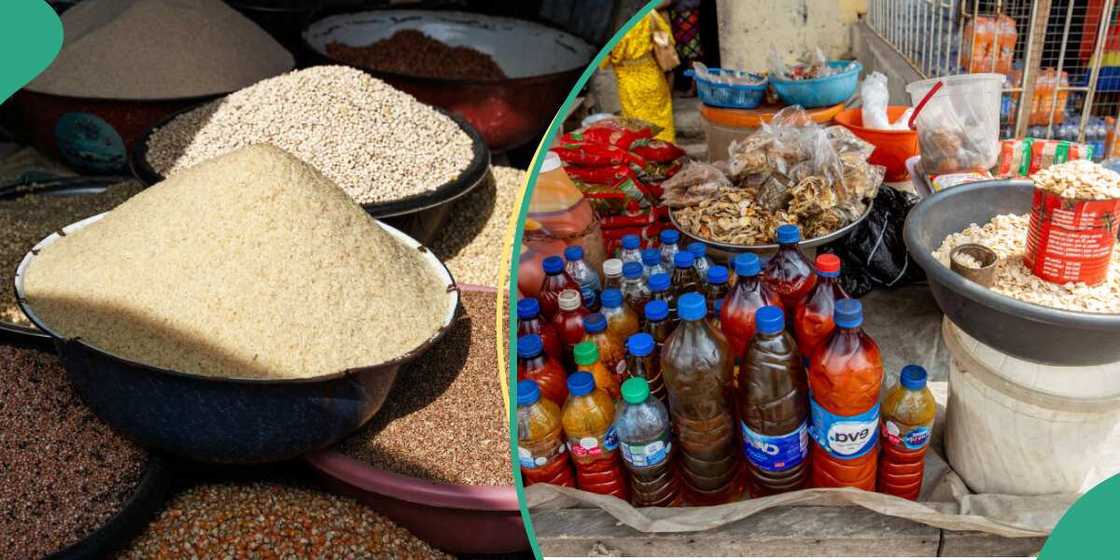Prices of Rice, Garri, Other Food Items to Rise as Inflation Hits Highest, Naira Falls
- Nigeria’s food inflation has risen to the highest in January 2024, according to a report by NBS
- The report stated that Nigeria’s inflation hit 29.90% in January 2024, the highest in 17 years
- It stated that food, transport, medicine, clothing, household equipment and other items contributed to the current figure
Pascal Oparada has over a decade of experience covering Tech, Energy, Stocks, Investments, and Economy.
Nigeria Bureau of Statistics (NBS) says the country’s annual inflation rate reached 29.90% in January 2024 as the naira depreciates in the official and black markets.
The Consumer Price Index report by NBS indicated that prices increased by 0.98% to 29.90% in January 2024, compared to N28.92% in December 2023.

Source: Getty Images
Inflation figure hits 17-year high
“On a year-on-year basis, the headline inflation rate was 8.08 per cent higher compared to the rate recorded in January 2023, which was 21.82 per cent,” the report stated.

Read also
CBN sets new customs exchange rate at over N1,500 as naira hits record low against US dollar
PAY ATTENTION: Click “See First” under the “Following” tab to see Legit.ng News on your Facebook News Feed!
The current figure surpasses projections by the Financial Derivates Company, which forecasted that inflation would rise to 29.73%.
The current inflation figure is the thirteenth consecutive increase and the highest in 17 years.
The increase in food inflation every month was due to a rise in the growth rate in the average prices of potatoes, yams and other tubers, bread and cereals, fish, meat, tobacco, and vegetables.
A breakdown shows the most affected items
An analysis of the NBS report of the consumer price index shows that food and non-alcoholic beverages contributed primarily to the increase, rising by 15.49%, followed by housing, water, electricity, gas, and other fuel, which rose by 5%.
Others are clothing and footwear, contributing 2.29%, transport at 1.95%, furnishings and household equipment and maintenance and education at 1.18%.
Others are health, goods and services, restaurants and hotels, alcoholic beverages, tobacco and kola, recreation and culture and communication.
Also, every year in January 2024, the Urban inflation rate hit 31.95%, 9.40% higher than the 22.25% recorded in January 2023.
In January 2024, the Rural inflation was about 28.10% every year, 6.97% higher than the 21.13% recorded in January 2023.
Every month, the Rural inflation rate in January 2024 was 2.57%, an increase of 0,40% compared to December 2023.
Road and air transport contributes to inflation
Core inflation stood at 23.59% every year in January 2024, an increase of 4.71% from 18.88% recorded in January 2023.
Passenger transport by road recorded the highest increases, followed by medical services and passenger air transport, among others.
Nigeria’s inflation has climbed steadily since January 2023, apart from December.
Journalist and social commentator Ishaya Ibrahim told Legit.ng that food inflation is the arrowhead of overall inflation.

Read also
Nigeria surpasses Saudi Arabia, UAE, emerges country with most increased crude oil production in January
He said inflation would be minimal when the Nigerian government could arrest the monstrous trend.
“I think food inflation is Nigeria’s worst nightmare. Other factors include insecurity and the lack of government incentives discouraging farmers from cultivating.
The talks about releasing grains from the reserves are mere talks because they will end up in private hands. The government should sell the grains to retailers at a subsidised rate, pushing down food inflation,” he said.
Naira crashes against the dollar in all FX markets
Legit.ng reported that on Wednesday, February 14, 2024, the naira depreciated against the dollar, crossing the N1,500/$ mark due to a sharp drop in foreign exchange turnover.
This comes barely 24 hours after the naira closed at N1499.07 to the dollar on Tuesday, bouncing back from its all-time low in the official foreign currency market.
The naira depreciated by 0.29% at the official market, closing at N1503/$, according to statistics from the Nigerian Autonomous Foreign Exchange Market (NAFEM) on Wednesday.
PAY ATTENTION: Donate to Legit Charity on Patreon. Your support matters!
Source: Legit.ng



